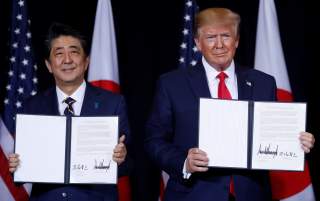Could the U.S.-Japan Trade Deal Help Trump's 2020 Election Chances?
The Trump campaign is hopeful that this trade deal with Tokyo will help to shore up support among this important voter group given the agreement’s focus on opening up Japan to American beef, pork, wheat, corn, ethanol, dairy products and wine.
Amid a protracted trade war with China and the resulting fallout of turbulent financial markets, the trade deal between U.S. President Donald Trump and Japanese Prime Minister Shinzo Abe is welcome news for Trump admit concerns over a slowing U.S. economy. The agreement—involving agriculture and digital trade—amounts to a win for Trump’s trade strategy and a positive development for his re-election efforts.
Both leaders signed the trade deal on the sidelines of September’s 74th session of the UN General Assembly in New York.
From the perspective of presidential campaign politics, Trump’s trade agreement with Abe is important symbolically as it demonstrates that, amid the difficulties of the trade war with China, the president can negotiate a trade deal that supports the U.S. economy. The president has been under increasing pressure to secure benefits from his combative trade policies, and the agriculture sector has expressed concern about losing market share in the increasingly important Asia-Pacific market.
Along these lines, Trump’s trade agreement with Japan provides relief to American farmers who have been hit hard in the trade war with China. The Trump campaign is hopeful that this trade deal with Tokyo will help to shore up support among this important voter group given the agreement’s focus on opening up Japan to American beef, pork, wheat, corn, ethanol, dairy products and wine.
According to some economists, Trump needs a trade deal with China in order to maintain the growth of the American economy. As the successful stewardship of the economy is Trump’s principal argument for deserving re-election, avoiding a recession is paramount. Absent a trade deal with China, the agreement with Japan—the world’s third-largest economy—is a welcome development for Trump.
Thus far in his presidency, Trump has used an aggressive policy of deregulation and a tax cut in 2017 to increase economic growth. While Trump works to avoid a further slide in the already slowing U.S. economy during an election year, he is unlikely to receive help from Congressional Democrats with implementing additional measures such as an additional round of tax cuts or by signing the revised NAFTA agreement (now called the United States-Mexico-Canada Agreement).
The president is left with few tools for revving up the economy. One option is an aggressive rate cut by the Fed, a policy instrument that Trump does not have control over. Another is a fresh round of deregulation. A third is a trade agreement that will allow Trump to argue that he is standing up for American workers.
Enter the Japan trade deal.
A political benefit to the trade deal with Japan is that the agreement does not require Congressional approval since the U.S. president by law can cut or eliminate tariffs that are less than 5 percent. This allows Trump to bypass his political adversaries in the U.S. House.
The Japan trade deal is also well-timed as it comes at a moment when the Trump administration is fighting trade disputes on multiple fronts. The agreement with Tokyo allows for Washington to begin what it ought to have done over two years ago—assembling a coalition of trade allies that can confront China with a united front.
The trade agreement with Tokyo—if signed—would allow Trump to assert that he has delivered on his promise of achieving stronger trade agreements for the United States that secure American economic interests, broaden markets and create jobs.
Commentators in Japan have criticized Abe, alleging that he gave away too much to Trump given that the president has not committed to removing U.S. tariffs on Japanese automobiles and auto parts. The Japanese have long hoped to secure protection from car tariffs, and many in Japan fear that opening up Japan’s market to American agricultural products will have a negative effect on Japanese farmers.
The problem is that a failure to obtain immunity from U.S. tariffs on Japan’s auto sector could be politically injurious to Abe. This is because he has invested significant political capital in cultivating a positive relationship with Trump who—despite being the guarantor of Japan’s defense amid China’s military rise—has been tough on Japan in the realm of trade.
It bears saying that as of this week, Japanese negotiators have thus far been unable to convince the Trump administration to drop threats of punitive car tariffs, and their efforts to this end are ongoing.
Yet, for Abe, the perfect need not be the enemy of the good. A deal that is tenable and that avoids a costly trade war with Washington is the order of the day when Abe sells it domestically.
For Trump, a trade agreement with Abe is both politically opportune and beneficial for key voter groups such as American farmers. Look for Trump and his campaign team to tout the deal’s positive benefits as a way of diverting attention away from the slowing American economy and ongoing U.S.-China trade struggles.
Ted Gover, PhD., writes on foreign policy and is the director of the Tribal Administration Program at Claremont Graduate University.
Image: Reuters

